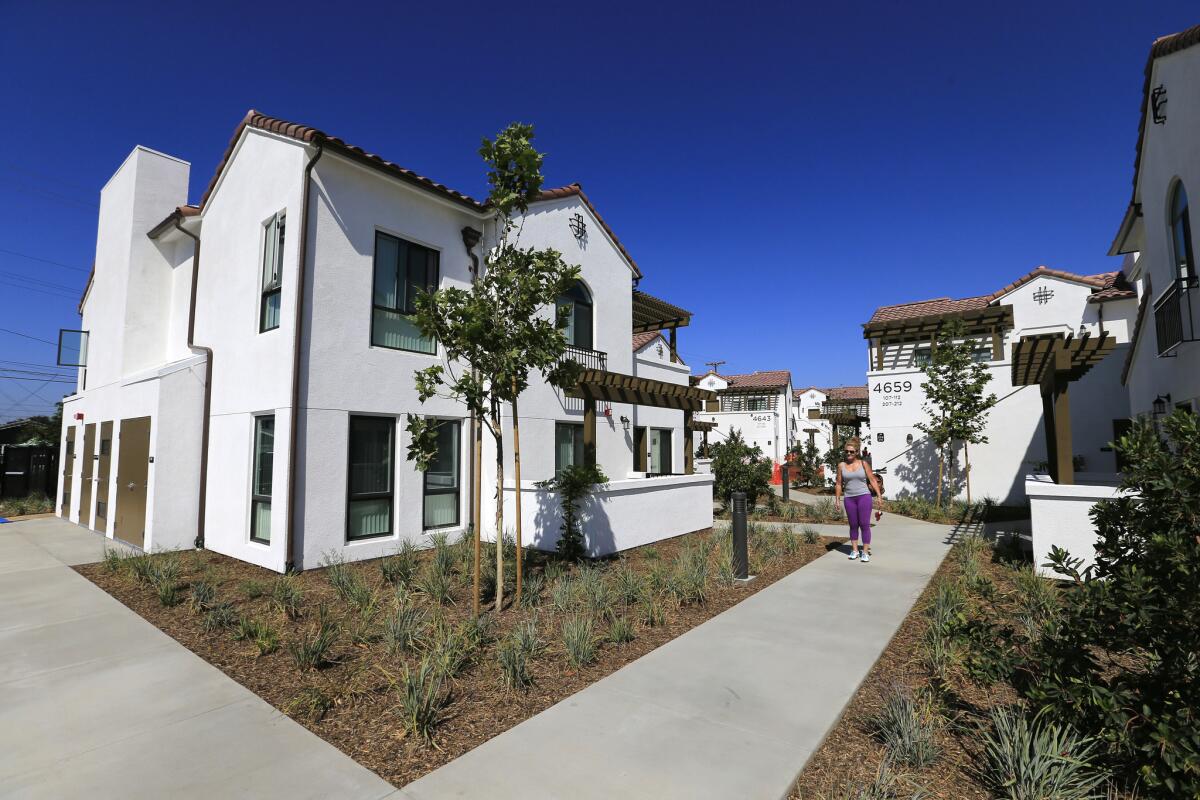Capitol Journal: Thanks to effective legislating, California lawmakers may soon pass affordable housing bills

Reporting from Sacramento — Democrats are about to achieve one of their top priorities for this legislative session: passing bills to confront California’s affordable housing shortage.
It’s a two-year session and this is only the first year. So if the Legislature and Gov. Jerry Brown can pull off a housing victory in the next few days, as they expect, it’ll be relatively swift action and something to high-five about.
Already this year, the Legislature has passed Brown’s top two priorities: a fuel-tax increase to pay for major road repairs, and an extension of the state’s unique climate-fighting cap-and-trade program that requires polluters to buy permits to emit greenhouses gasses.
Those previous two measures — especially the unpopular gas tax hike — cost a steep political price for some vulnerable legislators who voted for them.
But regardless of how one might feel about any of these major bills, they show that the governor and Legislature are effectively legislating in Sacramento, unlike President Trump and Congress in Washington, D.C.
The California Legislature is no longer dysfunctional, and hasn’t been for a few years.
A big reason, although it hasn’t worked in Washington: one-party rule. California Democrats not only own the governorship (and every statewide office), they hold supermajorities in both legislative houses. That means they can pass anything, even if it requires a two-thirds vote.
And when there are Democratic opponents, Brown and legislative leaders have been able to compromise with enough Republicans to pass their bills. That’s the opposite of bitterly divided Republican Washington.
Other reasons for the increased functionality are reforms approved by voters in the last decade. Eliminating the two-thirds vote requirement for spending bills ended budget gridlocks. Institutional memories and legislating experience were improved by loosening term limits. Banning gerrymandered redistricting and creating open primaries added more election competition.
Changes to key housing bill will give local governments in California more control over the money>>
The pending housing legislation doesn’t mark a giant leap toward ending homelessness. Nor will it dramatically increase the stock of affordable houses for sale or rent near jobs in urban areas. But it does represent a modest, incremental step. Then later they can take another incremental step. And that’s about the only way to get things done in this polarized era.
“Does the current catastrophic housing shortage demand more public investment?” state Treasurer John Chiang asked rhetorically in response to the legislative deal. “Damn right it does, but politics is the art of the possible.”
Chiang, who’s running for governor, had urged a “big and bold” housing bond issue of up to $9 billion. But he calls the Democrats’ $4-billion housing bond proposal “a start” that “will still move the needle away from the current trend where more and more freeway underpasses and parks are becoming makeshift housing.”
And this week the bond plan received a very clever amendment: $1 billion targeted for the popular Cal-Vet Farm and Home Loan Program. Who can possibly be against helping a veteran buy a house?
The Cal-Vet amendment came from Assembly Speaker Anthony Rendon (D-Paramount), whose highest legislative priority is affordable housing.
California voters have approved Cal-Vet bonds 23 times over the decades. More than 423,000 veterans have obtained low-interest home loans. But there’s only $200 million left in the kitty.
The best feature about the program is that it costs taxpayers nothing. The bonds are paid off by the vets’ mortgage payments.
That’s not true for the remaining $3 billion in the bond proposal. That would be paid back with tax money.
The bonds would be spent for several affordable housing programs, including construction of low-income rentals, high-density dwellings near transit and farmworker housing.
“Over the years, we’ve spent billions on housing programs — all of it for prisons and jails,” says Sen. Jim Beall (D-San Jose), the bond measure’s author. “There’s something wrong with that value system. We’re wising up.”
Before Brown would commit to signing a modest bond proposal for the 2018 ballot, he insisted on some regulatory reform that would expedite construction. That’s contained in a bill by Sen. Scott Wiener (D-San Francisco).
Wiener calls the lack of affordable housing “a contagion that is spreading like wildfire” across the state.
Under his bill, the state would force local governments to streamline their planning and permitting for housing developments. But to appease organized labor, which sometimes clogs the development process to strong-arm concessions from builders, Wiener agreed to prevailing wage requirements. That generated opposition from builders.
The legislation “does not provide the substantive reforms we need to increase our housing supply for middle-class families,” says Rob Lapsley, president of the California Business Roundtable. “The dirty little secret is that some of the proposals make housing more expensive by supporting construction unions’ demands.”
But the Wiener bill requires only a simple majority vote for passage.
In bigger jeopardy is a funding measure by Sen. Toni Atkins (D-San Diego) that needs a two-thirds vote. It would raise $250 million a year for low-income housing by tacking a $75 fee on many real estate transactions, but not home sales.
Legislators are leery of anything that sounds like a tax increase.
But affordable housing has momentum and the governor’s blessing. Some legislation is bound to pass.
They’ve got one-party rule in Washington, too, at least on paper. But when it comes to legislating, no one is ruling.
Follow @LATimesSkelton on Twitter
ALSO
Why the Legislature probably can’t fix California’s affordable housing problem
With Chad Mayes’ ouster, Assembly Republicans did what they often do: Dump their leaders
More to Read
Get the L.A. Times Politics newsletter
Deeply reported insights into legislation, politics and policy from Sacramento, Washington and beyond. In your inbox three times per week.
You may occasionally receive promotional content from the Los Angeles Times.











